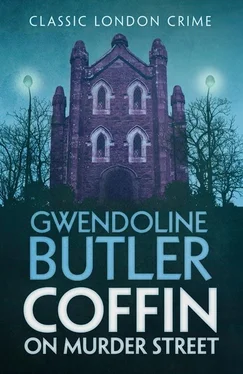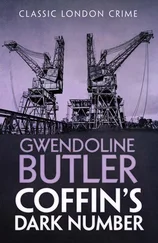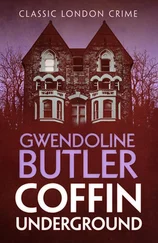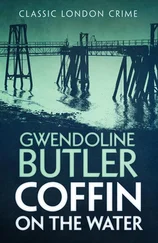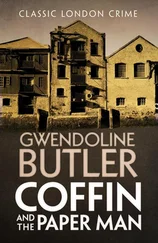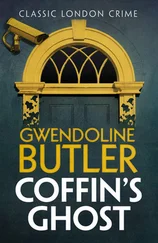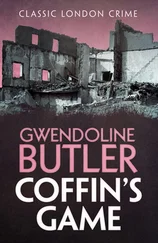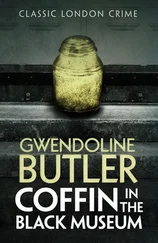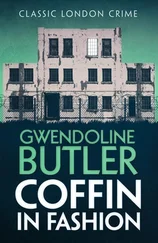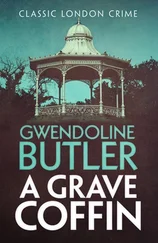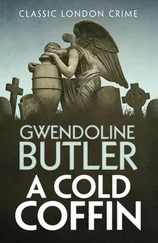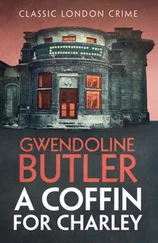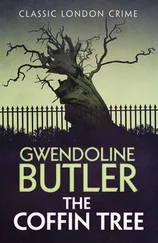GWENDOLINE BUTLER

HarperCollins Publishers ,
77–85 Fulham Palace Road,
Hammersmith, London W6 8JB
http://www.harpercollins.co.uk
First published in Great Britain by HarperCollins Publishers 1991
Copyright © Gwendoline Butler 1990
Cover layout design © HarperCollins Publishers 2014
Cover photographs © Shutterstock.com
Gwendoline Butler asserts the moral right to be identified as the author of this work
A catalogue copy of this book is available from the British Library.
All rights reserved under International and Pan-American Copyright Conventions. By payment of the required fees, you have been granted the nonexclusive, nontransferable right to access and read the text of this e-book on-screen. No part of this text may be reproduced, transmitted, downloaded, decompiled, reverse-engineered, or stored in or introduced into any information storage and retrieval system, in any form or by any means, whether electronic or mechanical, now known or hereinafter invented, without the express written permission of HarperCollins e-books.
HarperCollinsPublishers has made every reasonable effort to ensure that any picture content and written content in this ebook has been included or removed in accordance with the contractual and technological constraints in operation at the time of publication .
Source ISBN: 9780006471851
Ebook Edition © JULY 2014 ISBN 9780007544684
Version: 2014–07–02
Cover
Title Page
Copyright
Contents
Prologue
Chapter 1
Chapter 2
Chapter 3
Chapter 4
Chapter 5
Chapter 6
Chapter 7
Chapter 8
Chapter 9
Chapter 10
Chapter 11
Chapter 12
Chapter 13
Chapter 14
Chapter 15
Chapter 16
Chapter 17
Chapter 18
Chapter 19
Chapter 20
Chapter 21
Chapter 22
Chapter 23
Keep Reading
About the Author
Also by the Author
About the Publisher
‘In the real world, Proust would have killed Albertine.’
Gus Hamilton , speaking of the new play written about Marcel Proust.
John Coffin, Chief Commander of the Police Force in the newly created Second City of London, made up of the old boroughs of Spinnergate, Leathergate, Swinehouse and East Hythe, sat in the window-seat of his living-room in St Luke’s Mansions; he was preparing the text of his mad mother’s diary for publication. The arrival of this diary had been one of the greatest shocks of his adult life. He had been brought up, fatherless and motherless, by an aunt and a grandmother who had fostered the notion that his parents were dead. It was later in his life that he discovered that his mother had not died when he was a child but had gone on to have numerous other relationships and at least one other marriage. Other discoveries had followed. Mother had been quite a character.
He was a tall man, going grey neatly at the temples with sharp clear blue eyes from which the innocent confidence he had had as a young man had long since faded. They were still kind eyes, yet wary. It was a good face, but held no promise of being easy. Life had toughened him. Presently he stood up, stretched himself and looked down upon the territory where he was responsible for maintaining the Queen’s Peace as Chief Commander of the New City Force.
There was a killing taking place down there in Murder Street at that very time, but he did not know that yet. No one did, except the victim and the killer.
Coffin could look down on this world because he lived in the tower of a converted church. The tower of St Luke’s and part of the church had been converted into three separate dwelling places, of which his apartment in the tower was the biggest and the most romantic. He could see the River Thames, he could get a glimpse of Tower Bridge and, if he was lucky and the weather was right, the top of St Paul’s Cathedral. His authority stretched eastward and southward down the river towards Rotherhithe or Greenwich south of the river, but not including them.
He loved looking down on this London, his London, the new Second City of London, even though he knew better than most that the streets housed a great variety of thieves, housebreakers, pickpockets, sneak thieves, prostitutes, rapists and murderers.
But this was the new Docklands where many of the old warehouses and dock buildings, firmly built by their Victorian creators, had been turned into desirable and expensive places to live in. So the new rich had poured in, provoking some hostility from the old natives. A halt in prosperity had slowed the process down, and, while not making the poor richer, had made some of the rich much poorer. Not such a bad thing, he thought. All in all, the two communities were shaking down nicely together.
A bit of violence now and again, he would be the first to admit it, an occasional flash of social tension. But the murder statistics in his area were no worse than in the rest of the metropolis, which, considering, it housed one ancient thieves kitchen, still surviving in the original network of streets, was not bad.
His mother’s diary made an interesting study, especially to the family circle which had been its first readers. Mrs Coffin had not been a woman of much education, but she had an easy, racy style of writing which led you on. Her life had lived up to her style, being also easy and racy, and leading you on. She had left three children by different fathers, dumped around the globe. One in London, John Coffin, the eldest by far; another in Scotland; and a third, the only daughter, in New York. It was possible there were others, but the trio who had discovered one another’s existence by degrees, lived in some apprehension of more siblings. An extended family was one thing, but far-flung was ridiculous.
Laetitia Bingham, his half-sister, was the owner of the St Luke’s Mansions complex where she had bought this old Victorian church and developed the three apartments, of which she had sold one to John Coffin. She was turning the main church into an in-the-round theatre, and had established a Theatre Workshop on the rest of the land she owned. The Workshop was up and running, under the vigorous management of the actress, Stella Pinero.
Letty Bingham had just jettisoned her second husband (although her half-brother did not yet know this), and was planning to establish herself and her daughter in London. Letty was a successful international lawyer but her passion was the theatre. She pretended she was doing it all for her daughter who had just started drama school, but it was really for herself.
William was the third sibling, who had taken to law; he was a Writer to the Signet in Edinburgh. One way and another the law was in the blood.
The law, and a bit of drama, because you had to account for mother somehow. Perhaps her mother had been a Gaiety girl? And her father? Well, at one point in her diaries, she claimed he was King Edward VII.
Surprising this pull of the law, John Coffin thought, pouring himself a drink and taking a rest from his mother’s diary, because that lady herself had shown no respect for any law judging from the way she had gone on. He did wonder how much of her diary was fiction. That episode in the Hamburg hotel, for instance, with the man who had claimed to be a member of the Romanov family and who had given her a diamond tiara. Where was that tiara, he asked himself; had Mother pawned it?
Читать дальше
